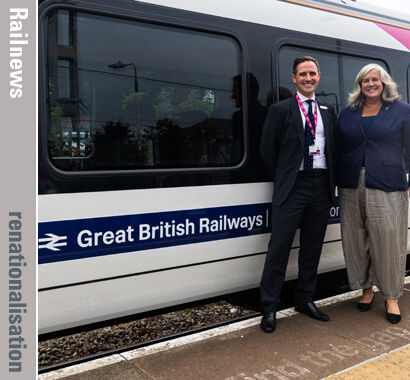The c2c National Rail Contract owned by Trenitalia will end at 02.00 on Sunday, as the operator becomes the second to be renationalised by the Labour government.
The first was South Western Railway, which passed into public ownership on 25 May, and the next will be Greater Anglia on 12 October.
The RMT has welcomed more renationalisation, but has renewed its call for outsourcing to be brought to an end as well.
Transport secretary Heidi Alexander said: ‘Whether you’re shopping in Lakeside or walking along the beach in Southend-on-Sea, from this Sunday you will be able to get there on a train service run by the public, for the public.
‘Public ownership is already tackling deep-rooted problems we see on the railway that’s led to spiralling costs, fragmentation and waste. A unified network under Great British Railways will take this further with one railway under one brand with one mission – delivering excellent services for passengers wherever they travel.’
c2c managing director Rob Mullen added: ‘We are proud of the reliable and high level of service we offer our passengers, consistently being rated as one of the best performing operators in the country.
‘We now have a golden opportunity to collaborate with the wider family of publicly owned operators, sharing our successes and best practice, but also learning from a wide range of different and diverse operators who have already benefited from public ownership, to drive even more improvements for the people and places we all serve.
‘A unified and focused railway can deliver more for our communities, including better growth, jobs and houses. If we are thriving as a train operator it helps our communities to thrive. This is the positive feedback loop we are excited to deliver, supported by better and closer collaboration with our partners in the lead up to GBR.’
Trenitalia is still a minority shareholder in Avanti West Coast, where the National Rail Contract has a break point in October 2026, which is expected to be renationalised then. Trentialia is part of the Italian transport group FS, and is also hoping to run open access international services between London and Paris.
Trenitalia UK managing director Ernesto Sicilia said: ‘Our management of c2c has been grounded in a resolve for continuous improvement and being in tune with the needs of the communities we serve. We acknowledge both the progress made and the ongoing challenges of unifying a fragmented rail industry. In the meantime, we will continue to support and deliver services on the Avanti West Coast franchise until it too transitions to public ownership in 2026.’
The fact that cleaners at c2c will still be employed by the private sector because cleaning is outsourced has been criticised by the RMT.
The union’s general secretary Eddie Dempsey said: ’It is great to see c2c being taken into public ownership in an important step along the road to Great British Railways.
‘However, the injustice of outsourcing must end so all railway workers can reap the benefits of public ownership and greedy private contractors can no longer extract obscene profits from the industry.
‘Our members working for Bidvest Noonan deserve decent pay and the same terms and conditions as their colleagues and we will fight tooth and nail to achieve it.’
The c2c franchise was originally known as LTS when it began on 26 May 1996 with National Express, and was rebranded c2c around the turn of the century. The meaning of ‘c2c’ was never clarified.
National Express won a second term in 2014 but sold the franchise to Trenitalia in 2017. All DfT franchises were abolished in September 2020 as a result of the Covid pandemic, and c2c has been a National Rail Contract since July 2021.
c2c will now be run by DfT Operator, the former Operator of Last Resort, which already runs four operators which were renationalised by the previous government, as well as South Western Railway.
The next major step will be the passage of a Railways Bill in Parliament from later this year to provide the legal framework for Great British Railways, the future ‘directing mind’ of the railway industry.
What do you think? Click here to let us know.


